The COVID-19 pandemic accelerated the digitalization of industries. Among these, healthcare organizations led in adoption and implementation. Moreover, the industry has put customer experience a top priority, which is a noticeable feature among standout CRM trends observed in other industries,.
Along this line, top healthcare organizations have shifted their CRM practice towards patient-centric processes, all the while keeping compliant with the Health Insurance Portability and Accountability Act of 1996 (HIPAA). The act ensures the security of personally identifiable healthcare information. However, not all CRM software solutions on the market today are HIPAA compliant. So, not all can provide healthcare institutions the necessary conditions to keep within legal bounds.
So, in this article, we will list down the best HIPAA-compliant healthcare CRM platforms that can help you integrate key information from different business functions, from patient data management to sales. This way, you will know which tools can help you connect seemingly disparate but insight-inducing data to bear on your operations for improvement.

Table of Contents
In light of the COVID-19 pandemic, healthcare and healthcare-related organizations were forced to expedite polishing up their digital touchpoints. Without having this infrastructure, they could not connect with both stakeholders and patients. Among the most important software solutions that helped them accomplish this are CRM tools. Organizations understand this and the fact is reflected by the surge in demand for CRM platforms.
No wonder then that researchers found that the CRM software market has been undergoing a boom. Data shows that the total increase in technology purchases has gone up by six percentage points from the year before the outbreak. The total increase in technology purchases in 2019 was only at 38%. Come COVID-stricken 2020, it went up to 44%. Moreover, experts expect that overall technology purchases will grow from 2.6% in 2020 to 3.4% by 2021.
Source: Market Research Future, 2021
They also observed that online CRM deployment has skyrocketed—from around 12% in 2008 to a commendable 87% in 2020. And, as Soffront (2021) has noted, CRM software solutions are the best tools for COVID-19 for businesses. This is because many CRM tools out there integrate various business functions into one digital hub. These include modules for team communication, customer engagement, project management, and analytics.
Share of Customer Online Engagement is Up
Having all of these in one spot is very important especially since the lion’s share of customer interactions are now digital. In North America, data shows that 65% of customer interactions are online in July 2020 (McKinsey, 2020). This was significantly higher than the 41% recorded in December 2019. At this rate, experts measured that adoption acceleration was expedited by three years in the region. This is also the global statistic with adoption in the Asia-Pacific region having boosted the most with an adoption acceleration of four years.
Top 20 CRM Software for Healthcare
1. Salesforce Health Cloud CRM

Salesforce Health Cloud CRM occupies the top of our list of best healthcare CRM software on the market today because of its industry-specific features. It helps users connect people, data, and processes under one digital roof. And, it is being used by premier healthcare and life sciences organizations like Lilly, Piedmont Healthcare, and United Healthcare.
Health Cloud, its patient relationship management platform powers these organizations by helping them monitor patient status and progress. Plus, it helps make information sharing and communication better and faster for caregiving teams. It is also being used by pharmaceutical organizations to help with their pipelines and client engagement. It is also HIPAA compliant.
Salesforce offers modules, including those for healthcare payers management, healthcare providers, and med-tech teams. Key features include medical records management, AI-empowered contextualized engagement capabilities, and analytics—specialized tools for healthcare. This set of tools include features for contact tracing, referral management, and a social determinant module. The latter helps assess critical social and environmental factors to help deal with barriers to healthcare and overall well-being. Moreover, it includes a set of customizable clinical and insurance data modeling tools.
The program integrates with tons of other software solutions, including Freshdesk, Zendesk, and many more. Also, it integrates seamlessly with electronic medical records software tools. It is available via iOS and Android device applications. Pricing starts at $25/user/month.
Detailed Salesforce CRM Review
2. LeadSquared
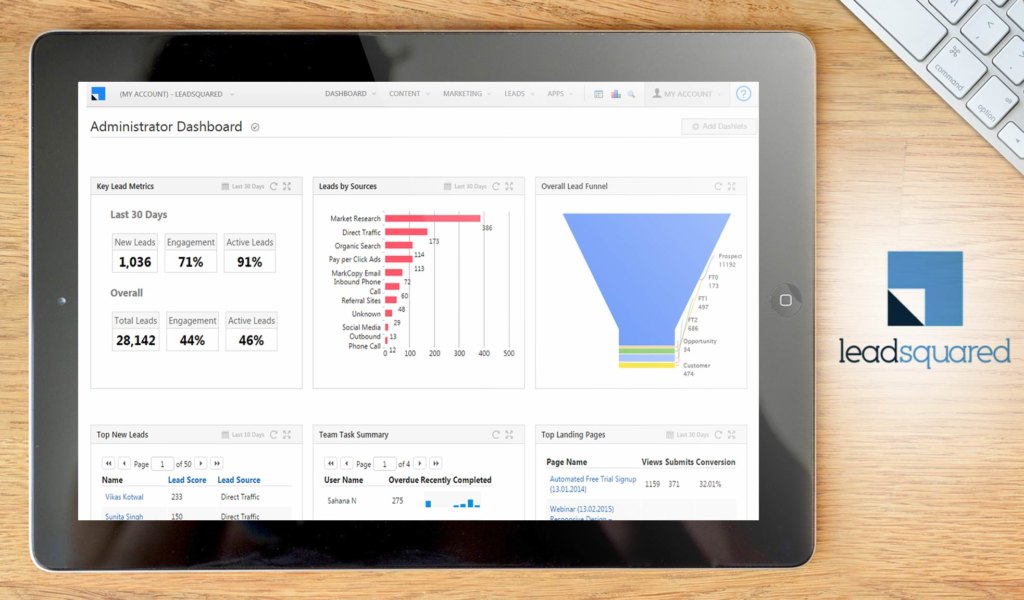
LeadSquared, with its out-of-the-box HIPAA compliance, helps healthcare businesses improve patient intake, management, and engagement.
With the software’s Business Associate Agreement (BAA) that protects patient health information (PHI), healthcare businesses have nothing to worry about, as LeadSquared manages all patient data with the utmost security.
The platform also offers a 360-degree view into the patient journey and helps you identify and eliminate friction points to create a seamless patient experience. You can easily integrate LeadSquared with your EHR to update patient status in real-time and enable collaboration across departments. The intake process can be simplified with automated appointment scheduling, digital forms, and self-serve digital portals.
As an all-in-one CRM, LeadSquared has something for every team! Trigger-based omnichannel marketing automation helps you increase referrals and even collect feedback to improve your services. At the same time, the mobile CRM makes your doctor’s and nurse’s day easy with reminders, notifications, and workday planning. Managers can monitor their team’s productivity, and view performance reports with just a few clicks to ensure that the internal processes are on track.
Overall, LeadSquared is an excellent choice for businesses looking for an easy-to-use, affordable Healthcare CRM with 24×7 support. Also, LeadSquared offers a developer-friendly API. In this way, you can connect it with other programs, such as EHR software solutions. You can try this tool for 15 days free of charge or choose from three plans starting at $25 per user/month
Detailed LeadSquared Sales + Mobile CRM Review
3. CRM Creatio

CRM Creatio is a low-code CRM software suite for businesses of all sizes across various industries. It is also being used in the pharmaceutical industry in providing excellent patient care. It offers users a comprehensive CRM database with modules for account management, contact management, segmentation, targeting, and various automation tools.
During the COVID-19 pandemic, CRM Creatio was recognized as one of the top HIPAA-compliant healthcare CRM providers. This is because it integrates CRM with business process management (BPM) features. And, this allows companies to modify their processes faster, be more agile, and be more cohesive.
Other important features include lead management, time management, budget planning, ROI estimation, and analytics with real diagrams. Of course, as a low-code platform, users can always create custom applications and workflow automation.
The platform can be deployed from the cloud or on-site. CRM Creatio also has native applications for iOS and Android devices. The company offers a 14-day free trial. So, you can test out the software first hand. Prices start at $30/user/month.
Detailed CRM Creatio Review
4. Netsuite CRM

Netsuite CRM is one of the top software tools used in a variety of industries. The platform provides organizations with a 360-degree CRM view in real-time. It is also popular among healthcare and healthcare-related organizations. These include Texas-based Recover Healthcare Corporation and AyurVAID Hospitals in India.
The platform allows healthcare organizations to have a single hub for all their B2B and B2C interactions. This helps organizations to not only provide better 24/7 real-time service but also save on administrative time and costs. Key features include time tracking, case management, knowledge management, analytics, and even a customer/patient portal to boot.
These help users streamline their caregiving processes and measure performance for further optimization. It puts everything in one place, including invoicing, financials, and inventory management. Because NetSuite understands that every organization is different, it is deployed according to your needs. Thus, it is only available via a personalized quote-based plan.
The web-based platform is also available on native apps on both Android and iOS devices. Moreover, it integrates well with other software solutions. The long list includes Microsoft Outlook, Pardot, and MailChimp. And, it is HIPAA compliant.
Detailed NetSuite CRM Review
5. monday.com CRM

monday.com CRM is an all-in-one digital business suite. It is highly customizable and very easy to use. Thus, it is flexible enough for businesses of all sizes across different industries. The company’s Enterprise Plan is also HIPAA compliant. Hence, it is widely used in healthcare settings. Key features include task management, team communication, patient management, customizable notifications, and workflow automation.
These features help healthcare organizations streamline their caregiving services. Moreover, monday.com, as a healthcare tool, has been truly tested. Aside from hundreds of nonprofit organizations, universities, and hospitals, it has also been deployed by the Israeli government in its fight against COVID-19. It is deployed in the country’s National COVID-19 Control Center, which brings together different military and civilian agencies. The software is used to support operations in labs, first-responders, and hospitals.
This is all thanks to monday.com’s communication hub where users can find all the right information, such as contacts and documents. Also, monday.com is very easy to deploy. It only took less than a day to be implemented at Israel’s National COVID-19 Control Center. And, it is customizable to support multiple complex workflows.
The platform is available on both iOS and Android devices. And, it also supports offline mode. The product integrates well with other software solutions, too. These include Slack, Asana, Pipedrive, and Trello. Also, it has a free individual plan that supports two seats. Paid plans start at $8/per seat/month.
Detailed monday.com Review
6. Zoho CRM
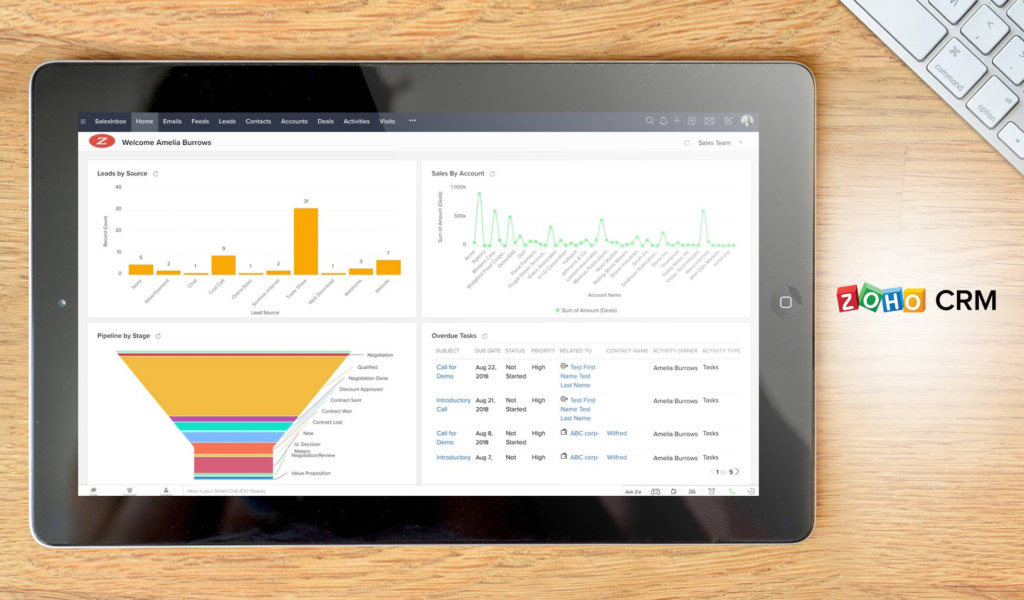
Zoho CRM is one of the most popular platforms out on the market today. The app is popular with both B2B and B2C businesses. And, because it’s HIPAA compliant, it’s being widely used in the life sciences industry. Moreover, Zoho CRM is highly customizable and is easy to use. It allows users to track customer behavior and leverage this for better patient care. Key product features include lead management, account management, workflow automation, and analytics.
The software also provides both social and mobile CRM tools. The former allows your team to view social interactions across different channels. Moreover, users can reply, comment, and like directly from the dashboard. Thus, they can save the time usually spent on switching windows. On the other hand, the mobile CRM module has features for searching nearby customers, receiving sales alerts, and lead capture.
Overall, Zoho CRM is a very comprehensive CRM tool. And, you can also extend its capabilities with various applications available in the Zoho Suite. Furthermore, the product integrates seamlessly with other software tools, including Xero, Survey Monkey, and Google Ads. The company offers a free trial and a free edition for smaller operations. Paid plans start at $18/user/month.
Detailed Zoho CRM Review
7. Zendesk Sell
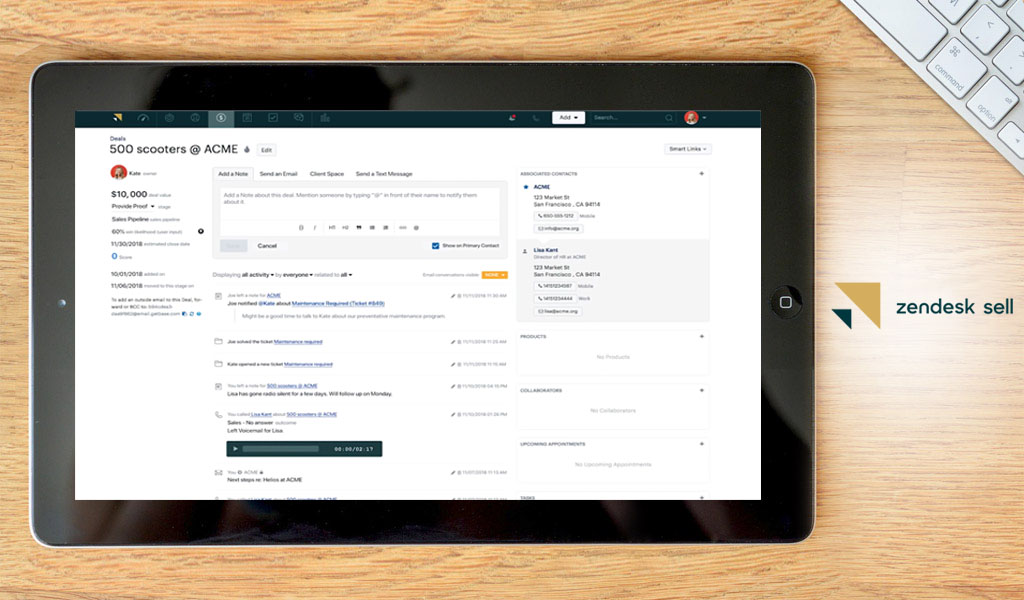
Zendesk Sell is a web-based sales HIPAA-compliant CRM software solution with an intuitive user interface. It is widely used in many industries, including healthcare organizations, especially by pharmaceutical and medical devices companies. The platform is known for its communication tracking and pipeline visibility features. This is because the software automatically logs all emails and calls. In this way, users will be able to keep track of customer information and the contexts of all interactions.
Key features include tools for communication, lead discovery, sales management, and productivity. The CRM platform also allows for omnichannel communications directly from its dashboard. Users can easily send a text or email with just a few clicks. Moreover, it also allows for email template customization. In this way, agents or sales representatives can save valuable time and effort.
Zendesk Sell can also be accessed via its native mobile apps for iOS and Android systems, allowing sales teams to close deals on any device and on the go. The mobile versions have helpful geolocation, lead tracking, and reporting features included. And, more importantly, it has an offline mode so you can work without an internet connection. Of course, the software automatically syncs your activity once you are connected again.
The company offers a free trial. So, you can check out and tinker with the software easily. It also integrates with other digital tools, including HubSpot, Harvest, Slack, Facebook, and Xero. Pricing starts at $19/user/month billed annually.
Detailed Zendesk Sell Review
8. vCita
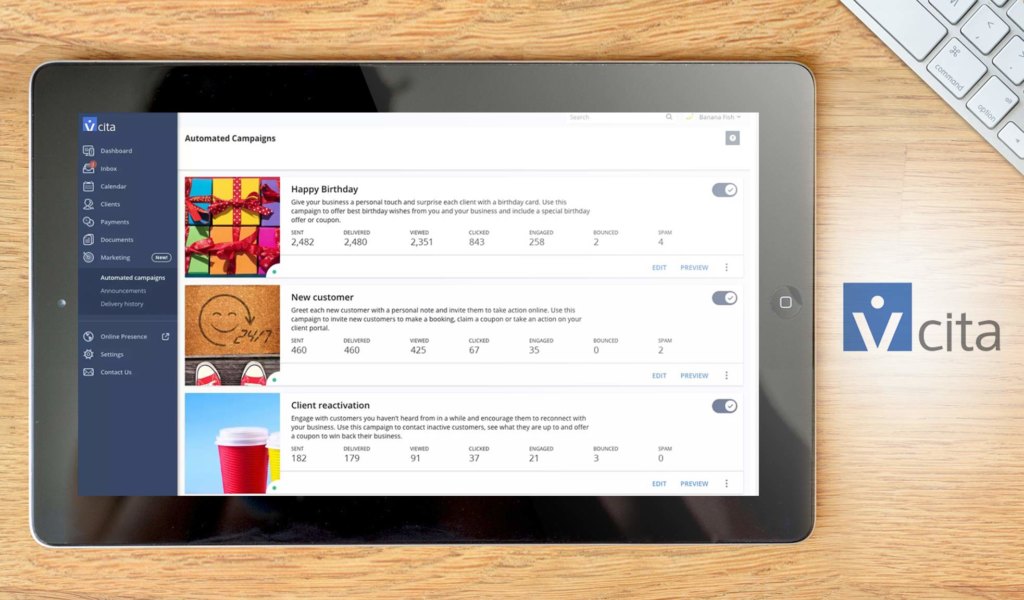
vcita is a complete business management solution for small businesses, including medical clinics and other healthcare or wellness service providers. It is primarily designed for SMB service providers and professionals, such as fitness trainers, lawyers, doctors, and educators. The platform integrates its robust CRM feature set with other business tools like those for bookings, appointments, online payment, and marketing.
Key features include a built-in scheduling menu, a client portal, secure online payment support, and contact management. It also offers a marketing toolkit that you can use to engage clients and upsell services. It comes complete with interactive widgets and coupon management features. Of course, it also sports tasks and team management capabilities with automated SMS reminders based on customized triggers. vcita also keeps your records safe and HIPAA-compliant through extensive security features.
vCita is also available, through its native mobile apps, to both iOS and Android devices. The software also integrates with other digital tools, including Wix, Facebook, Gmail, Quickbooks, and PayPal. Pricing starts at $19/month billed annually.
Detailed vcita Review
9. Real Simple Systems CRM

Real Simple Systems CRM is an easy-to-use CRM platform that integrates customer support, sales, and marketing into one software suite. And, as its name says, it is very intuitive and you can get to all the features in just a few clicks. What’s great is that it is so simple to use that you can use it immediately after subscribing to the service.
Key features include task management, calendar, case management, forecasting, pipeline management, and quotations. Also, it is HIPAA compliant, making it perfect for healthcare and healthcare-related institutions. And, thanks to customizability features, you can tailor the software according to your needs. These include the ability to create custom fields and custom dashboards. And, you can even customize page views at the individual level.
It also has a powerful analytics feature that would help you make better data-driven decisions. It comes complete with visualizations and charts to help generate insights and smooth out inter-department communications. Moreover, Real Simple Systems CRM has a free version available, supporting two users. The free version even includes an advanced sales weighting and probability feature.
The application is purely web-based with no native applications on mobile. However, it is fully optimized for it. It also integrates with many other solutions, including KashFlow, Microsoft Azure, and Microsoft Office 365. Pricing for paid plans starts at $14/user/month billed annually.
Detailed Spotler CRM Review
10. Onpipeline
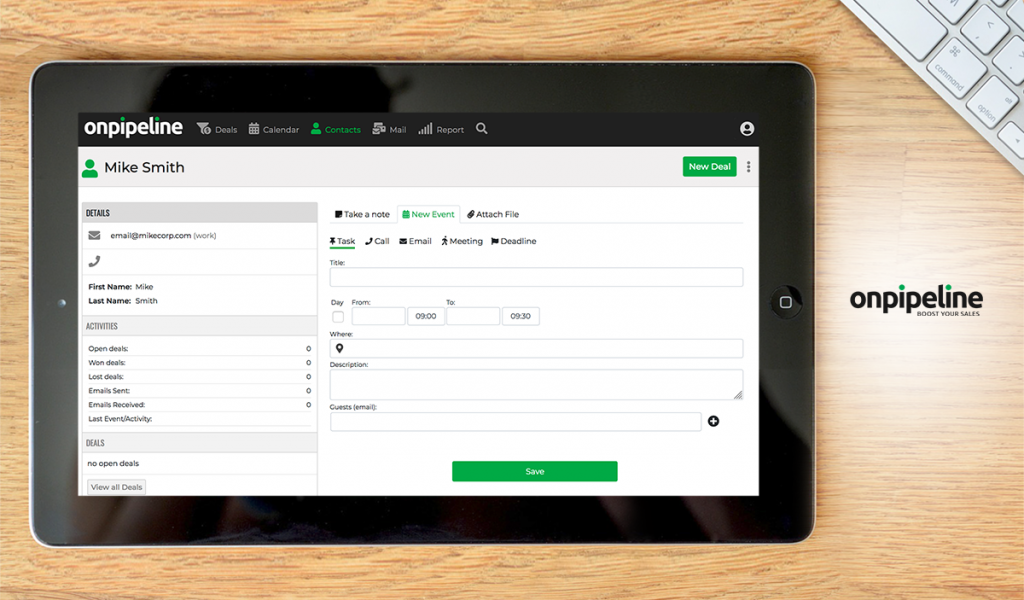
Onpipeline is a comprehensive CRM solution that is widely used by healthcare organizations. This HIPAA-compliant software is actually a suite of business tools. Its main modules include those for managing hospital information, patient relationships, billing, and call center operations. Within them are a large array of business process features integrated with a CRM base. These include email tracking, marketing automation, reporting tools, file manager, lead generation, quote management, and a sales pipeline view.
The platform is completely web-based and is mobile optimized. So, you can access it via any device and anywhere, provided you have an internet connection. It is known for its advanced email integration function that you can use to track email conversations and automatically link them to a deal or contact. Moreover, you can easily start a phone call with your contacts through its easy-to-use dashboard.
Also, Onpipeline provides users with access to its RESTful API. In this way, they can connect the platform to other solutions or even develop personalized features. This makes Onpipeline one of the most flexible and highly configurable healthcare CRM platforms today. Lastly, pricing starts at $12/user/month and Onpipeline also has a free trial available.
Detailed Onpipeline Review
11. PatientPop
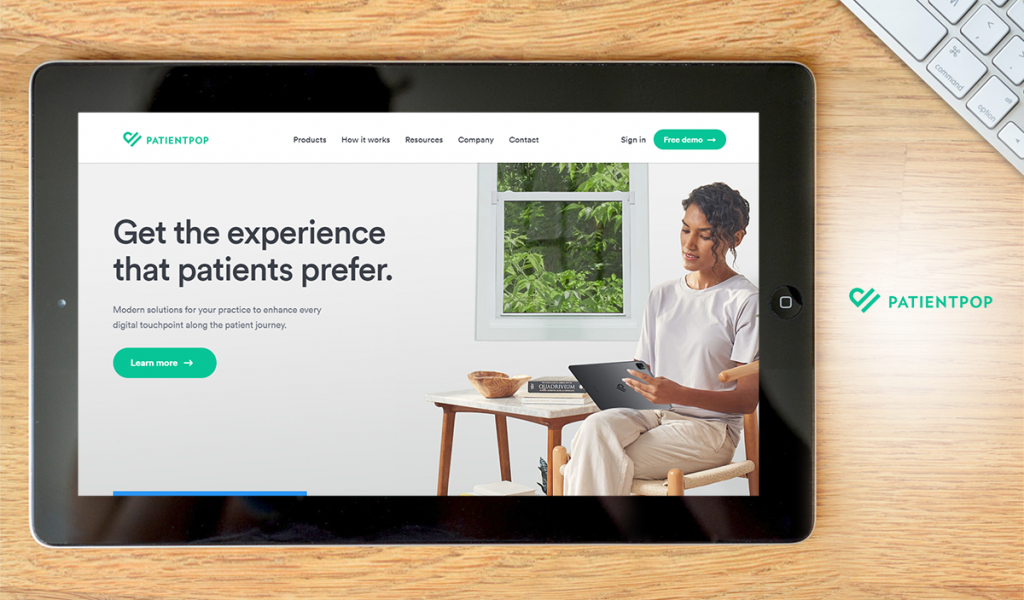
PatientPop is a HIPAA-compliant healthcare CRM and medical practice management solution. It helps healthcare businesses like clinics and hospitals manage their patients’ journeys. It provides tools to generate leads and manage patient relationships up to advocacy. Also, PatientPop makes modules for reputation management, online scheduling, content marketing, and even a practice portal available.
It guides patient journeys from online search to brand advocacy. This is thanks to its end-to-end tools that include those for integral business functions, from SEO and website management features to reputation management and paid advertising capabilities. Furthermore, the platform also provides users with the ability to book both physicians and patients for appointments. Thus, internal team operations can match the healthcare demands of patients.
Additionally, PatientPop is web-based and optimized for mobile web access. It also integrates seamlessly with 60 different electronic medical records (EMR) software solutions serving different markets. These markets include physical therapy, pediatrics, childen’s health, cancer, neurology, and many more.
Lastly, as PatientPop is deployed and configured to suit your business needs, it is only available in quote-based plans.
Detailed PatientPop Review
12. Caspio
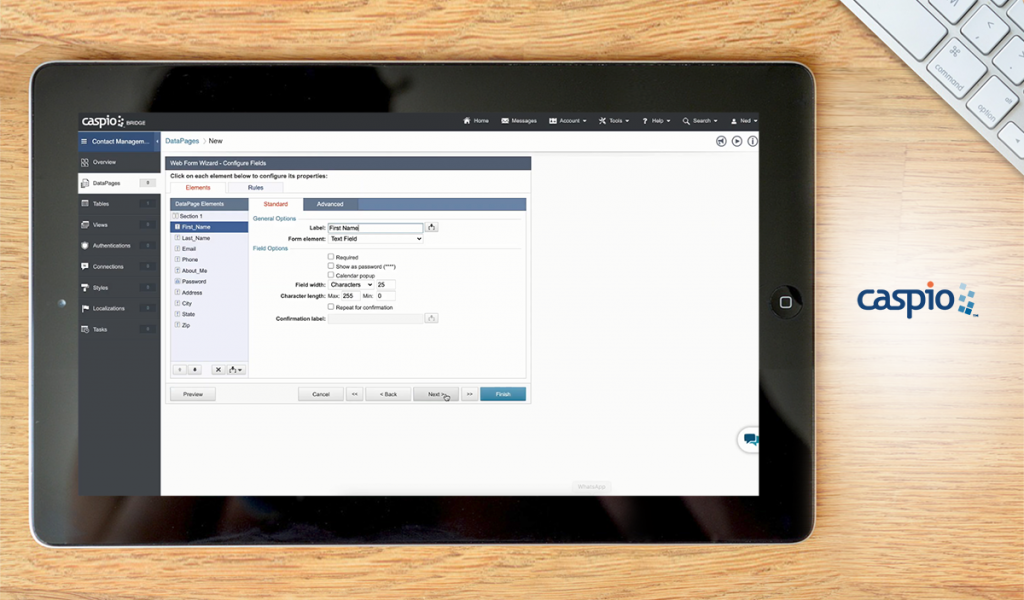
Caspio is a low-code app development platform that businesses use to create their very own CRM solutions. And, the product is also HIPAA compliant. So, many healthcare and insurance organizations find it as a go-to solution for managing patient relationships and sensitive data. It is used by healthcare and insurance institutions, including the American Red Cross, St. Jude Children’s Research Hospital, Liberty Mutual Insurance, and AstraZeneca.
With Caspio, you can create your own CRM software that fits your needs. This is perfect for organizations that do not want general CRM solutions with low customizability. Its low-code design workspace allows novices to create various automation tools, databases, and business process modules. These include those for creating user dashboards, the management of admin level access, and other tools to engage with customers.
As Caspio is a web-based platform, you can access it anytime, anywhere provided you have an internet connection. Unfortunately, it doesn’t have native mobile applications. It has a free plan but it isn’t HIPAA compliant. HIPAA compliant plans start at $400 per month.
Detailed Caspio Review
13. IMS InTouch
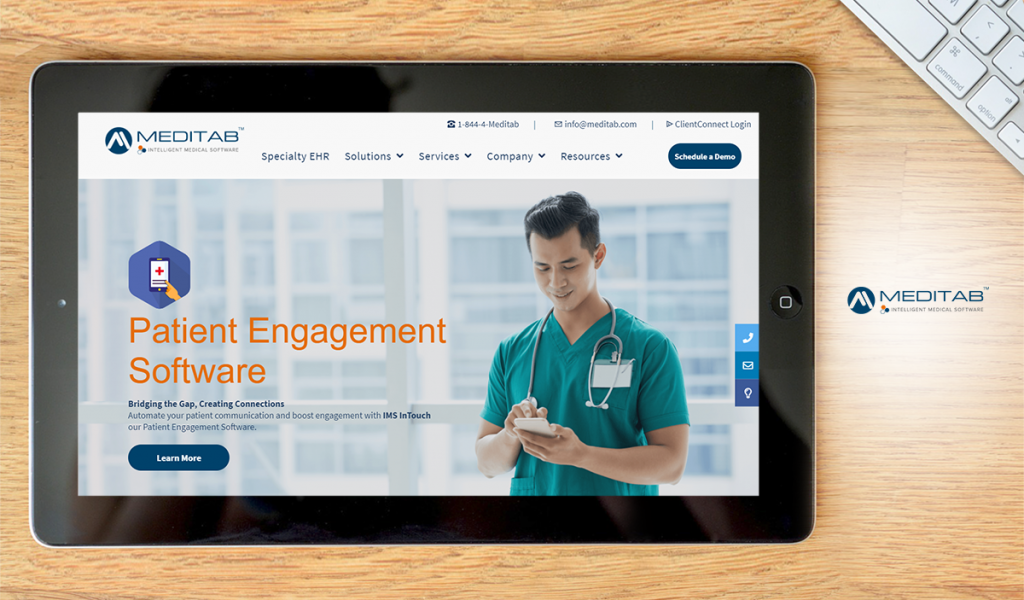
IMS InTouch is a patient management and engagement application that is HIPAA compliant. It also has an electronic medical record software tool to boot. In this way, you can manage both patients and practice right in the same digital control room. Key IMS InTouch CRM features include a CarePortal, a mobile Patient App, patient auto-check-in, and an omnichannel communication toolkit.
The toolkit includes features for managing emails, texts, and voice calls. As it is integrated into the EHR, it is inherently designed to support secure two-way messaging. Moreover, messaging can be automated between you and your patient population. You can send and reply in real-time or schedule them. Furthermore, you can configure automated voice messages with prompt responses in real-time as well.
Another cool feature is that IMS InTouch provides a virtual waiting room. It shows a HIPAA-compliant patient waiting list on TV screens in your lobbies. This way, you can keep customers engaged. Furthermore, you can even show ads and media on there as well.
Furthermore, it has native apps for both iOS and Android devices. It also integrates well with other platforms through its API. Lastly, the company offers a quote-based plan, allowing users to configure the platform properly according to their needs and preferences.
14. HIPAA CRM
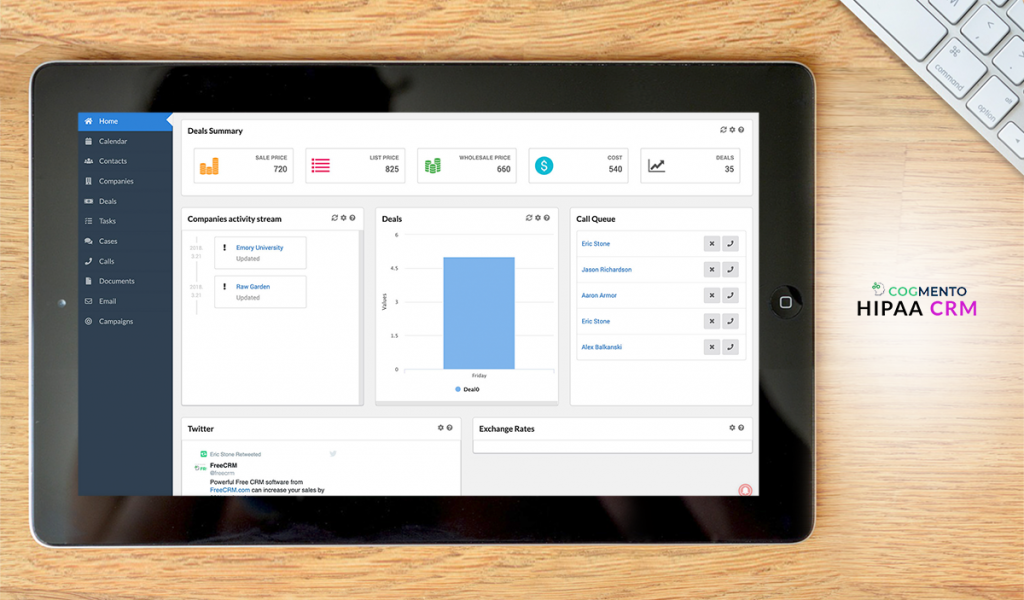
HIPAA CRM is another cloud-based CRM used widely in healthcare. As its name says, it is a HIPAA-compliant platform complete with patient management, marketing automation, and communication tools. The product is also fitted with dashboards and views like the Treatment and Sales Pipeline. And, these provide you with the capability to view your treatment and sales operations in a comprehensive fashion. Also, the visualizations are not the only thing that is intuitive, but also the controls.
Other key features include CRM document storage and sharing, web forms, API, custom views, CRM notifications, customizable CRM workflows, and voice CRM with call automation capabilities. These tools allow you to bring together data to inform you of your patient’s context and progress.
Also, the software provider offers a 30-day free trial for prospective users. So, if you think that HIPAA CRM might be a good match for you, then it is best to take advantage of this offer. HIPPA CRM pricing plans start at $50/user/month.
15. OperaDDS
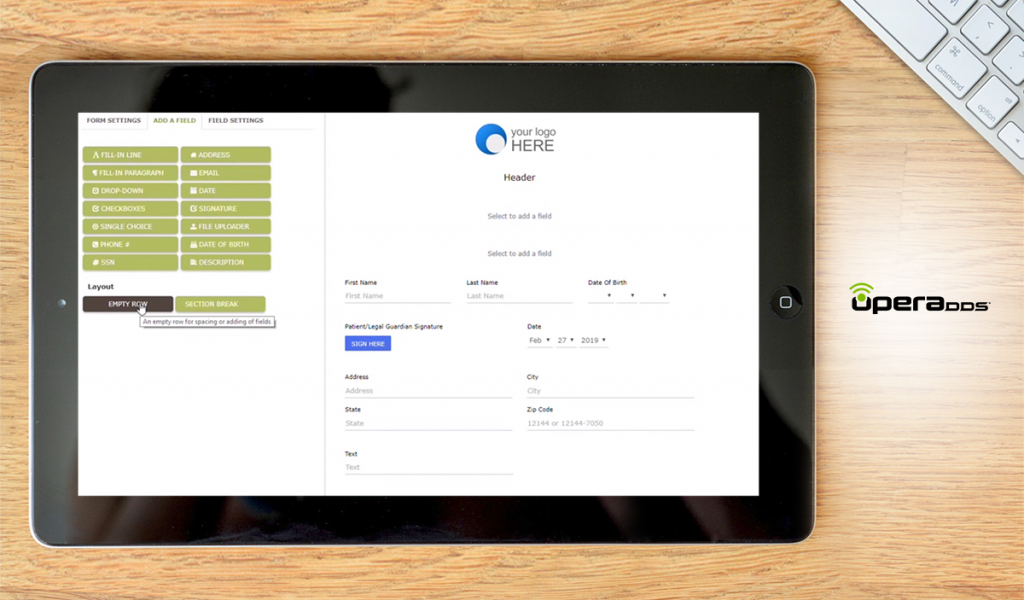
OperaDDS is a practice and patient management platform with a comprehensive set of features used by dental practitioners. These are housed in an intuitive and easy-to-use interface. And, the platform offers modules for reputation management, secure paperless form processing, patient reminders, reputation management, and internal communication tools.
These tools include a team OperaDDS Chat and Secure Email. And, of course, all communication using the platform complies with HIPAA.
Another neat module is Teledentistry. This allows users to easily schedule emergency appointments and even send photos to get dentists up to speed. With this patient-first capability, users can position themselves as future-forward digitally-powered practitioners.
Moreover, OperaDDS has native applications for iOs and Android devices. Pricing plans start at $99/month. However, HIPAA compliance is sold as an add-on, and so are the intraoffice chat and digital cases features.
16. Healthgrades Mercury CRM
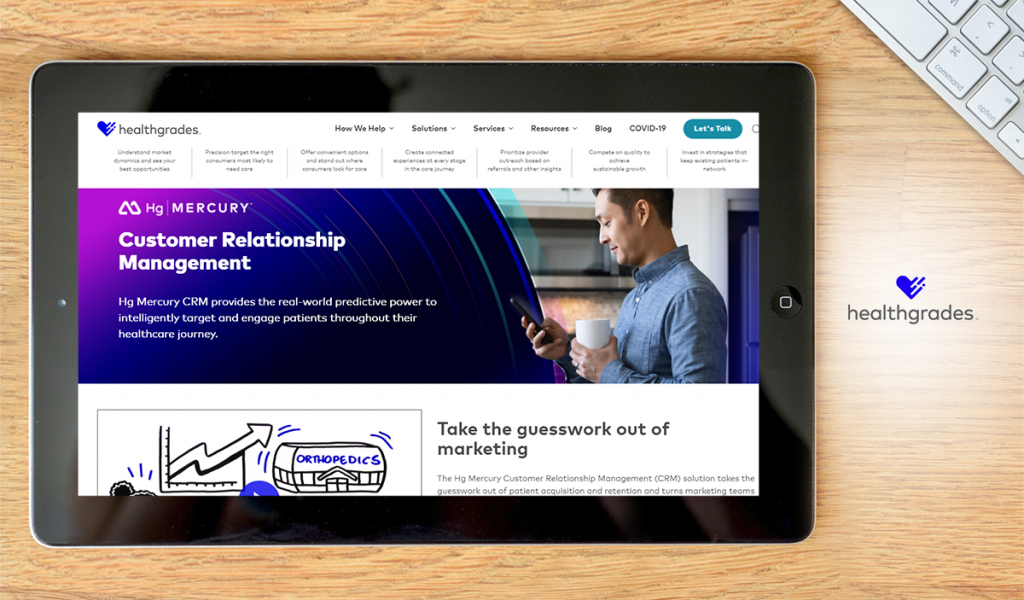
Healthgrades’s Hg Mercury CRM is a healthcare patient journey management platform. It allows users to leverage real-world predictive abilities to target and engage their patient base. Hence, you won’t have to do much guesswork when it comes to patient acquisition and retention. And, this is all thanks to its built-in predictive AI. Moreover, the platform also provides real-time campaign performance monitoring.
Thus, with these tools, users will be able to identify strategic opportunities and act accordingly. Through its Audience Insights feature, users can segment and prioritize their targets. Furthermore, the platform makes available over 500 unique household segmentation and propensity models. Thus, you will be able to create the right marketing campaigns for the right individuals. Also, these segmentation frameworks are regularly refined by Heatlhgrade’s in-house data scientists using advanced deep learning networks.
Additionally, engagement tools are also available, including capabilities for SMS text, email correspondence, outbound calls, and even direct mail. And, all engagement efforts are measured by real-time performance metrics. The platform also integrates with other solutions, such as Salesforce. Lastly, this HIPAA-compliant platform is only available via quote-based plans.
17. Enquire CRM
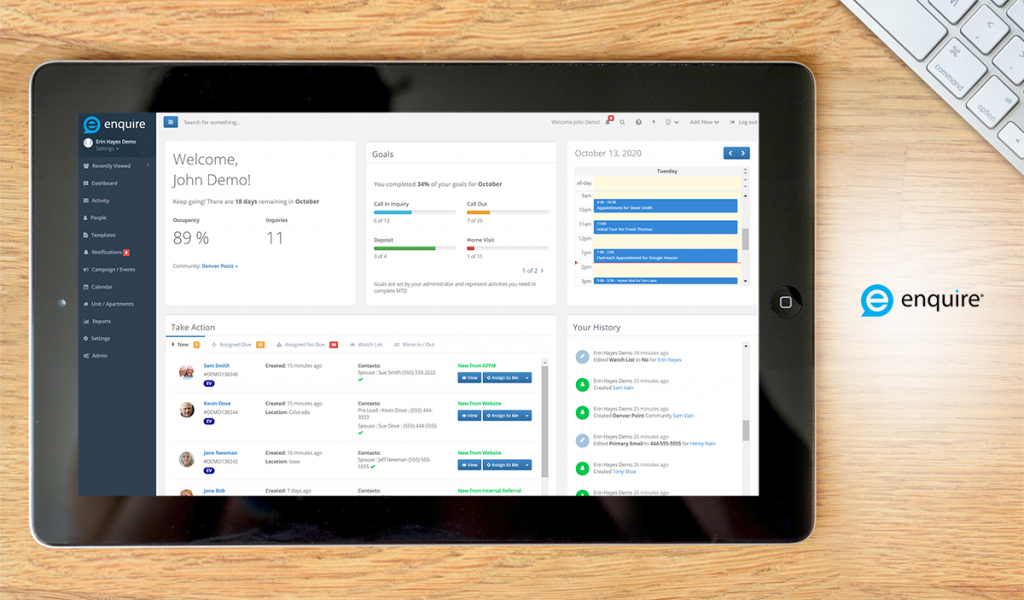
Enquire CRM is a healthcare CRM designed specifically for post-acute care and senior housing. It is mostly used in markets such as behavioral health, senior living communities, hospice and palliative care, and skilled nursing facilities, among others. Moreover, the platform is known for high customizability.
Hence, users get to deploy it according to their particular needs and preferences. These include workflow, terminology, and sales process customization. Thus, it is the go-to application for more than 5,000 senior and healthcare organizations in North America.
Also, another great thing about Enquire CRM is that all its comprehensive features are housed in a very intuitive interface design. And, you can get to all of them in just several clicks. The company also offers many other solutions that can extend Enquire CRM’s capability. These include tools for marketing automation, live chat, contact center, and business intelligence.
Enquire CRM also has a mobile application. However, it is only available on the App Store. Moreover, the platform integrates seamlessly with other business tools, including HubSpot, caremerge, Facebook, and Office 365. Lastly, Enquire CRM only offers quote-based plans as it is deployed according to your particular needs.
18. NexHealth
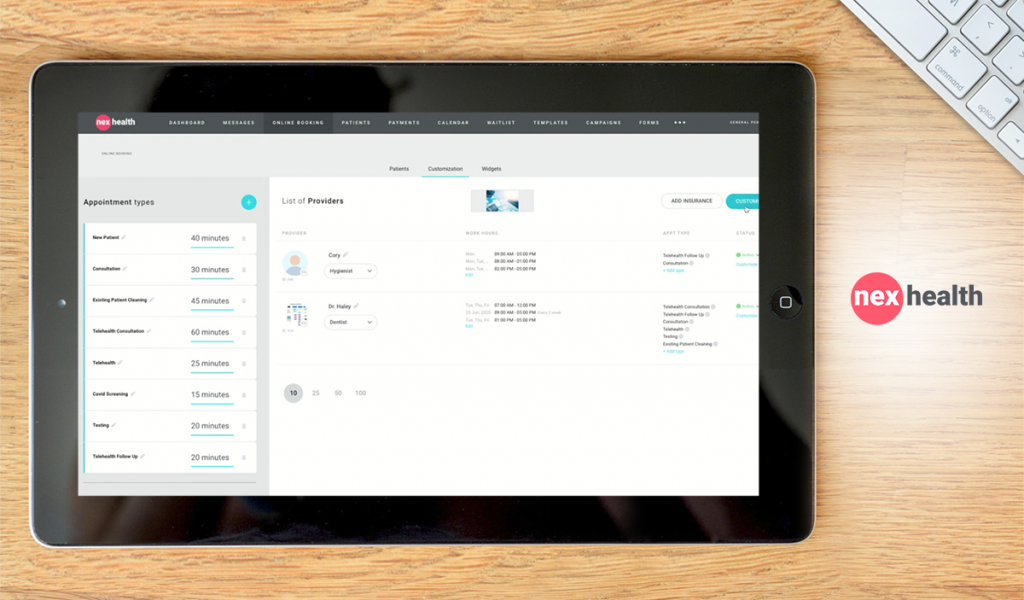
NexHealth is a patient experience solution targeted at doctors and developers. It offers real-time engagement and reporting tools. Thus, users will be able to be more responsive and agile. The platform provides modules for online scheduling, online payments, messaging, reminders, reviews, recalls, and even email and text marketing.
Clients use NexHealth to support and manage a wide range of business functions in acquiring new patients, retaining existing patients, and in modernizing patient experience. Satisfied NexHealth users include Bethany Medical Clinic, Community Dental Partners, and The Dermatology Specialists. Of course, it is also HIPAA compliant.
For developers behind these organizations, NexHealth enables them to merge patient experience management with EHR solutions. This enables them to save time and effort while adopting and maintaining the platform. This also allows them to create their own tools quicker. Thus, this makes it possible to extend the already powerful capabilities of NexHeath.
19. PlayMaker Health
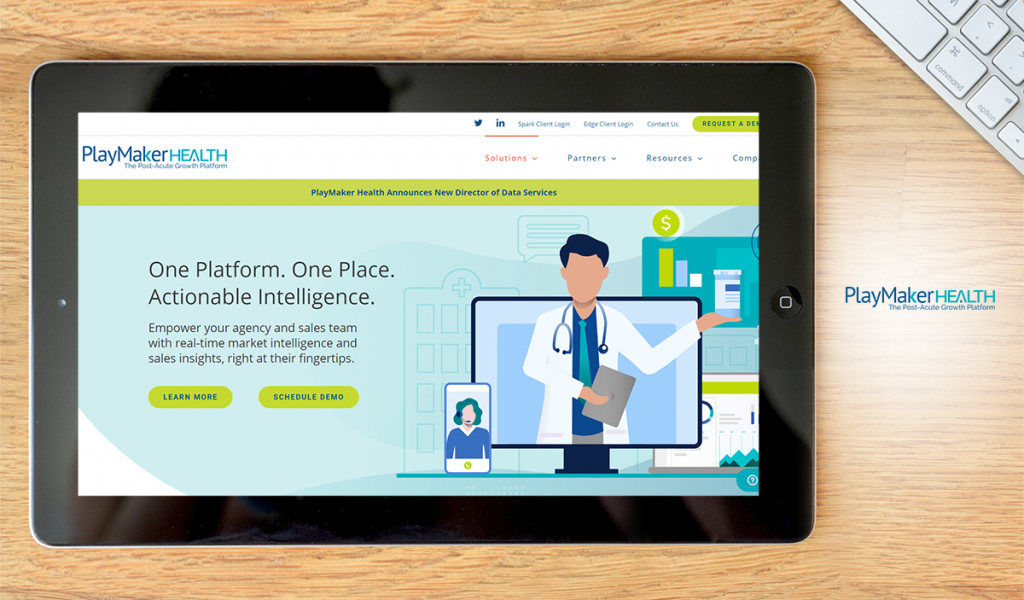
PlayMaker Health provides its clients with a comprehensive web-based CRM platform. However, it is not just a CRM platform. Sure, it started out in 2008 with the first-ever web-based CRM solution directed at post-acute care. But, it has evolved into an all-in-one solution integrating tools for market intelligence and sales insights.
It includes modules for referral management, sales analytics, competition analysis, and patient engagement tools. PlayMaker Health is popular with home medical equipment companies, infusion organizations, home health agencies, and hospice agencies. Of course, as the company caters to these markets, it is also HIPAA compliant.
Moreover, the platform also makes it easier for medical sales representatives and staff to access its database through its application called PlayMaker Spark. You can download it from the Play Store or the App Store depending on your mobile OS. Also, it integrates seamlessly with more than 35 popular EMR platforms as well. These include KanTime Healthcare Software, Brightree, and WellSky.
Lastly, the company only offers a quote-based plan. Hence, it is best to contact them for your personalized quote.
20. Zengine by WizeHive
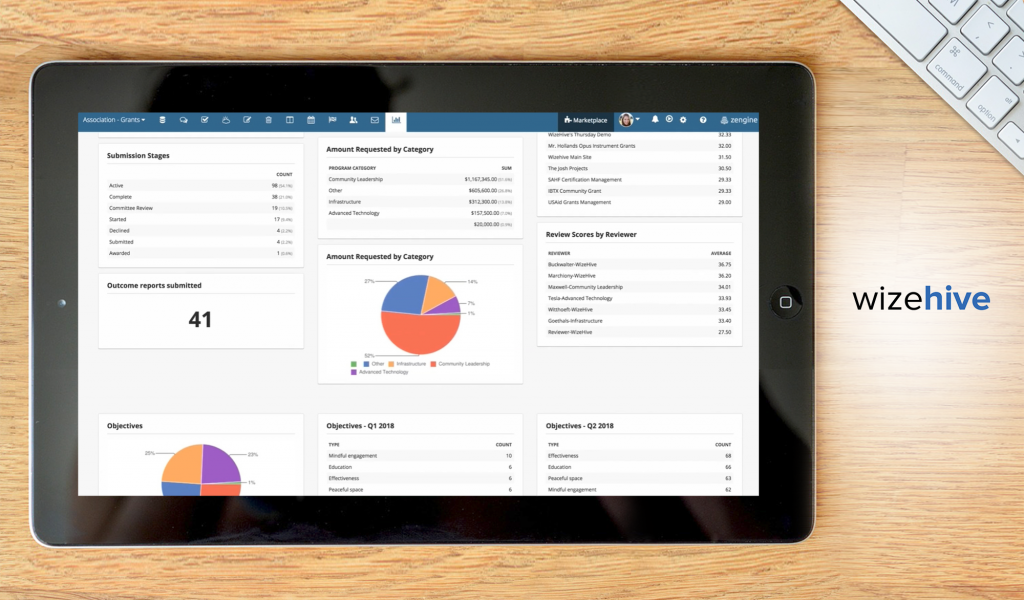
Zengine by WizeHive is a digital solution focused on helping mission-based organizations reach their goals. The solution is highly configurable and is HIPAA compliant. Thus, it is perfect for healthcare organizations to tailor a software solution according to their organizations’ needs and preferences. It is being used by many healthcare organizations as well to manage benefits and grants. Healthcare users include Northside Hospital, Houston Methodist, Sutter Health, and Children’s Hospital of Philadelphia.
Mainly a grant management platform, Zengine by WizeHive helps nonprofits to improve their health and wellness outcomes. It does this by providing the necessary tools for collecting, tracking, and monitoring data and progress. As a relationship management platform, it is mainly used to manage fellowship and internship relationships. It is also used to manage communications between donors, applicants, students, and volunteers. Its built-in CRM features allow organizations to engage them easily.
Other features include email automation, project planning and management, customer management, and reporting tools. The platform is totally web-based and has no native mobile apps yet. It integrates well with more than 1,000 digital tools, too. Also, as it is highly customizable, the pricing is also personalized. So, you can contact the company to get your quote.
Detailed Zengine by WizeHive Review
So, what is the best healthcare CRM for you?
Many of the best healthcare CRM software listed here are very flexible. And, anyone in the top 10 can do the job for most healthcare organizations. But, not all CRM platforms are created equal. There are other aspects to consider other than features and the interface. These include support, updates, self-service knowledgebase, and user community. And, when you consider all of these, Salesforce Health Cloud CRM comes out on top.
It doesn’t only have a comprehensive feature set but the company also offers top-level support. Representatives are always helpful and Salesforce’s active user community is also ready to help. Salesforce calls its user community the Trailblazer Community. Basically, it is a social networking site where Salesforce users can connect and learn skills and best practices. Other CRM solutions have user communities too. However, they are not as polished as that of Salesforce.
But, again, you would really do well with any of the top 10. Of course, you would do much better with any of the top five on our list. You can also check out Salesforce alternatives. But, of course, if you are already a NetSuite, maybe it is also best to check out NetSuite CRM as well. And, if you are a Zoho power user, then Zoho CRM might just be your best bet.
The best thing to do, however, is to leverage the free trial offerings from these software providers. You should also check out their user communities and more in-depth reviews here on FinancesOnline. But, what is best to consider is that having a CRM in today’s market is very essential. Recent CRM statistics show that customer experience is of paramount importance, especially in a digital world. So, if you are not yet using a CRM platform, it is time to stop lagging behind.
Key Insights
- Pandemic-Driven Digitalization: The COVID-19 pandemic significantly accelerated the digital transformation in the healthcare sector, with a focus on enhancing customer experience through CRM systems.
- Patient-Centric CRM: Top healthcare organizations have adopted patient-centric CRM practices while ensuring compliance with HIPAA regulations to protect patient data.
- Growth in CRM Market: There has been a notable increase in CRM software market demand, driven by the need for integrated digital solutions to manage patient data, communications, and operations.
- Cloud Deployment Surge: The deployment of CRM systems over the cloud has seen a substantial rise, with online CRM usage skyrocketing to 87% in 2020.
- Increased Online Engagement: A significant increase in digital customer interactions was observed, with North American customer interactions online rising from 41% in December 2019 to 65% in July 2020.
- Top Healthcare CRM Solutions: The article lists and reviews 20 top HIPAA-compliant healthcare CRM platforms, highlighting their features, integrations, and pricing to help healthcare organizations make informed decisions.
FAQ
- What prompted the acceleration of digital transformation in the healthcare industry?
The COVID-19 pandemic accelerated digital transformation in the healthcare industry as organizations needed to enhance their digital touchpoints to connect with stakeholders and patients effectively.
- Why is HIPAA compliance important for healthcare CRM platforms?
HIPAA compliance is crucial for healthcare CRM platforms to ensure the security and confidentiality of personally identifiable healthcare information, thus keeping healthcare institutions within legal bounds.
- What are the benefits of using a healthcare CRM platform?
Healthcare CRM platforms help integrate patient data management, improve patient engagement, streamline communications, and ensure compliance with healthcare regulations, leading to better patient care and operational efficiency.
- How has the demand for CRM software changed during the pandemic?
The demand for CRM software has increased, with the market experiencing a boom as healthcare organizations seek integrated solutions to manage patient interactions and business operations digitally.
- What features make Salesforce Health Cloud CRM a top choice for healthcare organizations?
Salesforce Health Cloud CRM offers industry-specific features like patient relationship management, medical records management, AI-empowered engagement tools, and customizable clinical data modeling, making it a comprehensive solution for healthcare organizations.
- How do cloud-based CRM solutions benefit healthcare organizations?
Cloud-based CRM solutions offer scalability, accessibility from any location, cost savings on infrastructure, and ease of integration with other digital tools, enhancing overall operational efficiency.
- What is the significance of increased online customer engagement in healthcare?
Increased online customer engagement signifies a shift towards digital interactions, necessitating robust CRM systems to manage and enhance patient experiences effectively.
- Can healthcare organizations customize their CRM platforms?
Yes, many healthcare CRM platforms offer customization options to tailor features, workflows, and data management according to the specific needs of the organization.
- What factors should healthcare organizations consider when choosing a CRM platform?
Healthcare organizations should consider factors such as HIPAA compliance, integration capabilities, user-friendly interface, customization options, support and community resources, and pricing when choosing a CRM platform.






























Leave a comment!